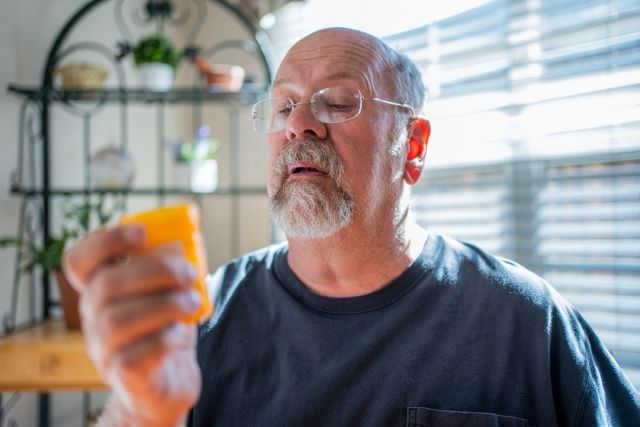So, you’ve been prescribed a new medication. Maybe it’s the first or maybe it’s the fifth that you must fill and take regularly. Your healthcare provider (HCP) likely will have talked with you about how often to take the drug. You may have also discussed why following your prescription closely—what’s known as “medication adherence”—is so important.
But did you cover the possible challenges of sticking with your medication schedule? Or the effects of not taking your prescription the right way?
Though taking your meds as directed may sound simple, it can be tough for many people. In fact, it’s estimated that up to half of people with chronic conditions don’t take their prescription medications as directed, for a variety of reasons.
One way to prevent this: Plan for obstacles that could keep you from taking your medications as prescribed. It will help you maximize the benefits of treatment.
Start with your healthcare contact
If the information you receive during healthcare visits seems like a lot, you’re not alone: Research suggests people may remember and understand just 50 percent of what they talk about during medical appointments.
Why might that be the case?
For starters, prescription dosage can be hard to grasp, especially if you’re taking drugs for multiple health issues. Some medications also need to be taken with food, others on an empty stomach, and others at different times throughout the day. But getting accurate information from an HCP is key to taking your medication exactly right.
So, take notes during your healthcare visits, either with pen and paper or your smartphone. Before you leave the office, it may help to read those notes back to your HCP so so that you are both clear on instructions.
Tap your pharmacist’s knowledge
Pharmacists are also there to answer your questions. When you fill a new prescription, you will likely be offered a pharmacist consult. Some states even require pharmacists to offer this consult. Don’t be afraid to accept it. Think in advance about questions you might have about your new drug. These might include:
- What is this medication, and what will it do for me?
- What is the best way for me to take this drug and when should I take it (with or without food, before bed or in the morning, etc.)?
- What should I do if I forget a dose?
- What should I do if I accidently double a dose?
- What should I watch out for in terms of side effects? What actions should I take if I experience them?
- Will this drug interact with any foods or supplements?
- What’s the best source of information if I have other questions?
Be a patient patient
Not every drug will have an effect right away, which can be frustrating.
Consider prescriptions for heart disease, for example. You may take a medication to treat a condition—such as high cholesterol or high blood pressure—that has no outward symptoms. As a result, it won’t be obvious to you if the drug is working. In cases like these, you’ll need to wait till your next HCP visit to find out whether your numbers are improving and medication is benefiting you.
It’s important to remember that drugs used for these conditions only work if you take them as prescribed. So, if you stop taking them, your cholesterol or blood pressure levels will likely rise. This can set you on the path toward more serious heart disease.
With other types of prescriptions, you may notice improvement quickly. This could tempt you to stop taking the drug before you’ve completed the full course. One example is antibiotics.
When you take an antibiotic to clear up an infection, you may start to feel better in just a few days. As a result, you might decide to stop taking the drug. But stopping antibiotics too early could invite a return of the infection. Even worse, it might come back resistant to the antibiotics that would have worked if they had been taken correctly.
With other medications, stopping them suddenly can be dangerous because of how the body reacts. So, you need to understand how to taper off of them slowly. The bottom line: Always check with your HCP before you stop taking a medication earlier than prescribed.
Anticipate the side-effect effect
In some cases, side effects may appear but eventually ease up or go away. This can happen with some antidepressants, for example. Having patience while your body adjusts to the medication is important.
It can help to plan for this period of adjustment. For example, insomnia can be a side effect of some drugs in the early stages. So, consider keeping your daily schedule light while you take the time to adapt.
There’s also the flip side: What happens when side effects don’t go away, especially if you’re taking a drug without a set end date? Rather than stopping your drug, have a discussion with your HCP about pros and cons. Talk about how the expected benefits of the drug compare to the side effects you’re experiencing. Sometimes, switching to a different drug in the same category can help.
A note of caution: With side effects that are alarming or that you know are warning signs, seek medical help right away. Always ask if you’re not sure.
Make use of digital safety nets
Another common hurdle to taking medication as prescribed is the when, where, and how:
- When do you take it?
- How do you take it? With or without food? Do you avoid other drugs?
- Where do you take it? For example, if the drug must be injected, it’s important to make sure you’re doing it in the right place at the right time.
First, you’ll need to figure out how all of these factors fit into your schedule. Then, with your HCP’s help, you can find the best way to make them a part of your routine.
Lots of tools are available to help you remember your medication, including smartphone apps. (Search “medication tracker” or “medication reminder” to find them.) Many pharmacies also let you sign up for email, text, or phone alerts about your next refill. They’ll even contact your HCP if you’re out of refills. Pharmacies that offer 90-day refills by mail can save you time, and you don’t have to make a trip for pickup.
Finally, remember that you’re not alone. Your HCP can answer any questions you have. And when it comes to managing your prescriptions, there are no bad questions.






